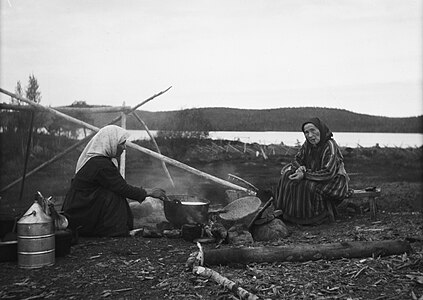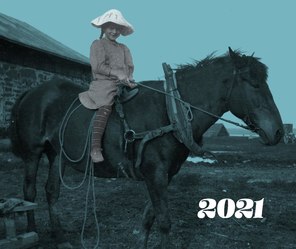GLAM/Newsletter/October 2020/Contents/Finland report
|
Postponed Hack4FI GLAM hackathon turned into an online global Hack4OpenGLAM

Avoin GLAM - The Finnish Open GLAM working group has organized the Hack4FI Open GLAM hackathons since 2015. This year, in March, meals had been ordered and the staff of the Finnish National Gallery were prepared for a long weekend when the precautionary measures to limit the Coronavirus pandemic forced to cancel the event.
Together with the Creative Commons Open GLAM platform and backed by Wikimedia Finland, Avoin GLAM decided to propose the hackathon for the Creative Commons Global Summit, which had also been postponed and transformed into a virtual event. The result was the inauguration of a new online GLAM hackathon, Hack4OpenGLAM.
The event spanned over five days 19–23 October, starting one day before the CC Summit with a workshop program, running parallel with the program as an online hacking space and culminating in a Final Gala after the Summit days.
We had 102 signed-up participants and altogether 32 workshop and kickoff session presenters who spoke 32 languages including R, SQL, Python and Java. A clear majority identified as open culture advocates, and a third as wikimedians as well as GLAM professionals.
Kickoff events
Students of the H2020 European Training Network POEM facilitated the two kickoff sessions that introduced the thematics of GLAM hackathons. What is a GLAM hackathon? lead by Franziska Mucha brought together the different views and experiences of co-creation events from Ilias Kyriazis from Coding da Vinci, Ivonne Kristiani from Retas Budaya Indonesia and Tuomas Nolvi from Hack4FI.
The session Accessing cultural heritage – Approaches from high to low lead by Angeliki Tzouganatou and Quoc-Tan Tran looked at Open Access to cultural heritage and the machine-readable Commons from different perspectives as Jolan Wuyts from Europeana, Anni Saisto from the Pori Art Museum in Finland, Thomas Flynn from Sketchfab, Alden Page from Creative Commons Search, Ryan King from the Smithsonian and Henrik Summanen from the Swedish National Heritage Board presented their angles.
-
GIT IF UP: Jan Ainali as Vincent van Gogh
-
Saara Valle making cheese and baking bread in Nirrola. Images from the depictathon.
-
Musings of a Cat by Arunesh Varade. Special mention in GIF IT UP India 2020.
The workshops
The workshops were organized in a breathtaking 14-hour streamed event. Vahur Puik and Kimmo Virtanen presented Ajapaik.ee, a crowdsourcing platform for enriching pictorial content. In their workshop Aleksandra Strzelichowska from Europeana and Medhavi Gandhi from The Heritage Lab, India inspired folks to participate in the ongoing #GIFITUP2020 campaign by exploring simple animation techniques and free tools available online. The Open GLAM translation sprint by Evelin Heidel from the Creative Commons Open GLAM Platform and Ariadna Matas from Europeana was a huge success, with translated articles being published in the Open GLAM Medium publication. In the Depictathon Suvi King and Inker-Anni Linkola-Aikio from The Sámi Archives, Finland, Anne Seipijärvi from the Inari Sámi Wikipedia, Bas Nederveen from the Rijksmuseum, and Isla Haddow-Flood and Florence Devouard representing the ISA Tool were invited together to explore decolonizing collections metadata in Wikimedia Commons. Albin Larsson and Jan Ainali brought the sessions of Wikipedia Weekly to Hack4OpenGLAM. In this episode, they edited Wikidata and displayed some SPARQL queries as well as timeline and map visualizations. The idea of the Open Geo Commons was explored by Arun Ganesh. The workshop was simultaneously part of the celebrations for the 8th birthday of Wikidata arranged by WikiProject India. Louise Hisayasu from Tactical Tech explored the world of persuasive design and design tricks in her workshop Keep Calm and Spot the Design Tricks. Sam Oyeyele arranged Months of African Cinema Wikipedia editathon as part of the contest happening throughout October and November. Kat Thornton presented Science Stories, the winner of the LODLAM 2020 Challenge, in the workshop Telling the stories of amazing scientists with open data. Sandra Trostel concluded the day by presenting and screening her openly licensed documentary film All Creatures Welcome where the members of Chaos Computer Club, Europe's biggest association of hackers, define hacking as a mindset.
Shoutout to Inari Sámi Wikipedia
Monday 19 October was also the birthday of the Inari Sámi Wikipedia, which was established on the very same day. Congratulations to the small indigenous language community of only around 350 speakers for doing this amazing work!
Pitching, hacking and celebrating
The hackathon brought together creators, ideas, and open cultural heritage ready to be reused. 31 GLAM collections included lists of openly available resources collected from the internet and from fellow hackathons, but also from institutions who presented their collections in person. All the projects and materials can be reviewed and participants contacted through the Dashboard, which will also include the video documentation as soon as it is available.
Institutions, their collections and projects
The Finnish institutions joined the international event and invited people to hack their projects. Taika Dahlbom and Hanna-Leena Paloposki from The Finnish National Gallery presented their brand new API that can access the CC0 data and images of around 12 000 artworks from their collections. Tomi Ahoranta from The National Archives of Finland organized a crowdsourced drive to identify fallen Finnish WW2 soldiers by their identification tags. Anni Minkkinen and Helena Schulman from the The National Museum of Finland presented their project from prison: the collection to be hacked was a preserved prison cell. Petri Leskinen and Jouni Tuominen from Linked Data Finland presented BiographySampo - a linked data resource mined from Finnish biographies and Mikko Koho the Mapping Manuscript Migrations Knowledge Graph.
The event gathered sprint projects from the world over: Sum of all Indian paintings datathon by Jane Darnell and Bodhisattwa Mandal, Visualizing WWII art dealer networks in 60,000 artworks by Laurel Zuckerman and Upgrade Source links in Image Collection South East Asia by Liesbeth van Wijk from the Leiden University Library.

Special mention
It is rare to see in-copyright artworks being openly licensed. Konstsamfundet and the Amos Rex museum made the works of Birger Carlstedt (1907–1975) openly available in their collections and shared them on Wikimedia Commons, aided by Lina Winqvist Normoyle at Projekt Fredrika and Wikimedia Finland.
Hack projects
Many projects were created during the hackathon and many more were finding new connections for working together. Sandra Fauconnier presented the workflow she had set up to import cultural heritage 3D models from Sketchfab to Wikimedia Commons and describing them with Structured Data on Commons statements. Katri Niinikangas created a calendar for 2021 from openly available images of animals, and it is available in Wikimedia Commons. Arunesh Varade took one of openly licensed images from the collections of the DAG museums and turned it into an AR experience. Andrew Lih worked on the Knowledge Grapher, an easy tool to create a knowledge graph of an artist's works and what they depict. The projects Fortepan Iowa by Bettina Fabos, Isaac Campbell and their team, Art Pluriverse: Balkan community archives presented by Mariana Ziku and Wikidocumentaries by Susanna Ånäs share synergies about local history. None of our team members were able to complete their hackathon projects, but we were enjoying creating the event! Ranjit Menon had brought Ravine - modern rock video. Tuomas Nolvi and Pekka Kauranen from Yle had planned to work on a Twitter bot for Yle's Wikimedia Commons images whereas Tove Ørsted from the Aalto University Archives missed working with the Student life during 100- years project.
Thank you also to everyone whose projects were not mentioned, from DIY science tools to a virtual museum! Find out more and get in contact with interesting projects by browsing the Dashboard. If you missed the event, the recordings will be available there soon. All links are additionally stored in a Zotero folder.
Thank you all for joining, and thank you for the organizers of the CC Summit for the opportunity and support!
| Home | About | Archives | Subscribe | Suggestions | Newsroom |







